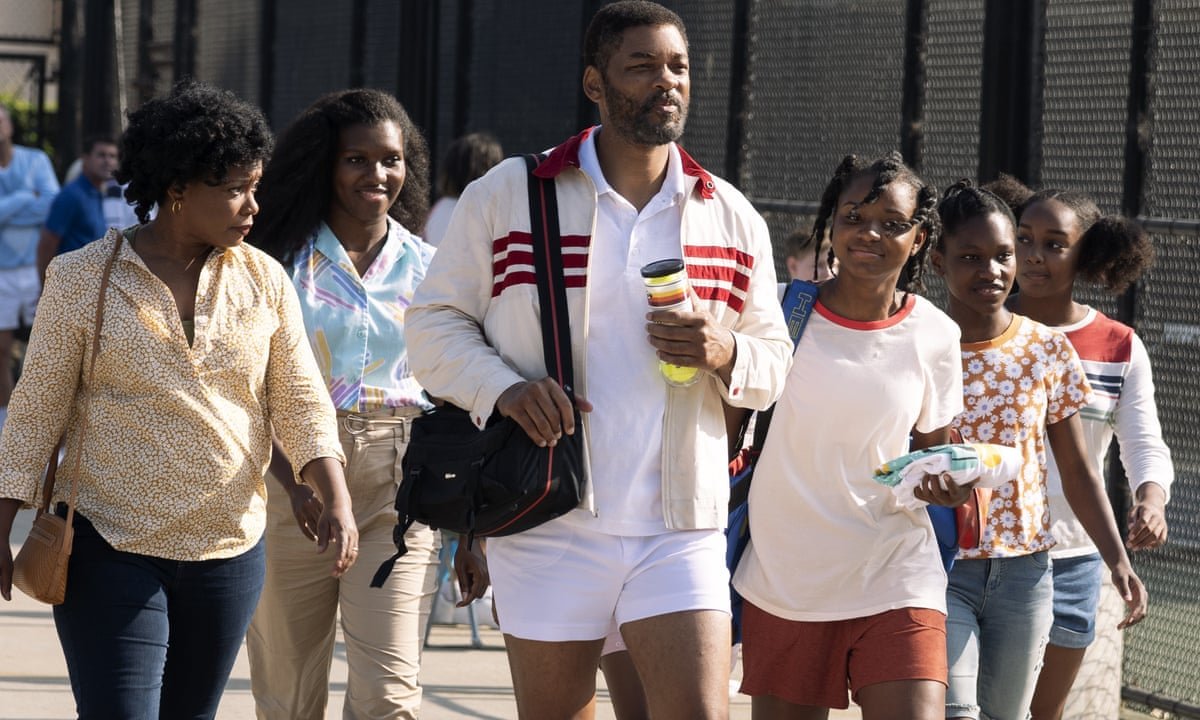Watching the film it's pretty clear what King Richard wants to say about Richard Williams. The movie wants to present a flawed man who had a resourceful and willful desire to see his daughters reach places that he himself and others he saw around him never saw. You get the sense that the film would like to present a balance of Richard's ego and harmful self aggrandizing versus the social economic inhibitors and buffers black people face just trying to be anything in an unjust world. In a nuanced way this this film would have been a film I would have loved to death, something of an ode to black fathers and a critique, and in fits and spurts you get pieces of that type of film. The beginning of the film features a sort of montage of Richard's various meetings with various white Tennis coaches that turn him down in various white ways. The scenes properly demonstrate these buffers be they economic or racial, and they play well against Richard's insightful, driven, but also overbearing personality. Later on in the film when there is an argument between Richard and his wife ( played quite wonderfully by Aunjanue Ellis ) about his stubbornness and his unilateral decision making , we really get a taste of where and when his will meets walls that make him a very tough man to live with and morbidly insensitive, but these moments also end up showing the film's scriptural weaknesses every bit as much as they show its strengths, especially as it pertains to Will Smith. Maybe the greatest moment of conflict in the movie comes a full hour and 39 minutes into the film, which is problematic in and of itself but pushing that to the side- we see Richard get into a second confrontation with his wife over yet another unilateral decision made by Richard over whether or not his daughter will attend a tournament. Now it’s important to state that the first time he does this Richard is warned by his wife that he can never again make another decision like this without first consulting her and without really listening to what it is his girls actually want or there will be consequences….and yet he does it again and script wise, there is no real consequence or push back that comes from this, simply more talking. This is in fact realistic and it happens in many marriages and close knit relationships, but this doesn't come in a way that allows or conjures examination about Brandi and her position, how trapped she might feel, or maybe even erased by a man who continues to be wilfully obtuse about his own need for martyrdom and to be the singular figure and role player in these girls lives. Will Smith's compounds this issue because he himself has built such a career off being likable he simply does not pull off in any meaningful way these traits beyond the most basic ask of the writing. I don't even think it's that hes not trying, it’s just that the idea of being able to go to that place where you yourself become ugly to the audience or nasty, mean, vile , or any of the sort is foreign to him.. he doesn't understand the concept. Don't let the words I used fool you into believing that I think that Richard needed to be vile or necessarily nasty I'm just bringing them up as varying possibilities for that I know that Will can't do. For this film I think mean spirited, rude, obnoxious, cold, thoughtless, and condescending, as it pertains to the script depiction of Richard come to mind, but only through the piecing together of exposition and context. Will himself doesn’t give himself over to very much of this. For context and comparison let's take a look at another scene which I think exemplifies even the slightest level of that want or ability to make oneself appear unlikable, I’ll use this scene from Michael Mann's “Heat”. Where DeNiro first meets Amy Brenneman…


